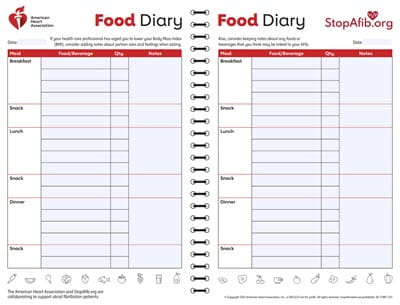Lifestyle Strategies for Atrial Fibrillation (AFib or AF)
What can I do to prevent (reduce my risk for) atrial fibrillation (AFib)?
To reduce your risk for the onset of AFib, maintaining a heart-healthy lifestyle is always your best option. If you have been diagnosed with AFib, take medications if they are prescribed for you, and get proper treatment and management of your condition so you can reduce the risk of AFib’s harmful consequences.
View an animation of atrial fibrillation.
What can I do to reduce my risk of complications associated with atrial fibrillation?
- Get regular physical activity
- Eat a heart-healthy diet, low in salt, saturated fats, trans fats, and cholesterol
- Manage high blood pressure
- Avoid excessive amounts of alcohol and caffeine
- Don’t smoke
- Control cholesterol
- Maintain a healthy weight

Download: Food Diary (PDF)
All of these goals aide in the prevention of (reducing the risk for) heart disease, and will help keep your circulatory system in the best condition.
Other underlying conditions may need treatment because they can contribute to the onset of AFib:
- High blood pressure (hypertension)
- Sleep apnea
- Thyroid disease (hyperthyroidism)
- Diabetes
- Chronic lung disease
- Other heart conditions (heart attack, heart valve disease, or heart failure)
- Family history
- Obesity
What can I do to prevent (reduce my risk for) stroke?
The risk of stroke in the AFib patient is as much as 5 times greater than that of the person without the heart disease.
Get treated
The treatment of AFib is imperative for the prevention of (reducing the risk for) stroke.
Know your additional risk factors
Some other examples of stroke risk factors are:
- History of high blood pressure
- Increased age
- Previous stroke or transient ischemic attack (TIA)
- Diabetes
- Heart disease
- Family history
- Obesity
- Smoking
Commit to a heart-healthy lifestyle
The good news is that up to 80 percent of strokes can be prevented. You can control your risk factors by changing your lifestyle and by treating your medical conditions as instructed.
Download our patient information sheets on how to live a heart-healthy lifestyle.
Video: John Criswell's AFib story








